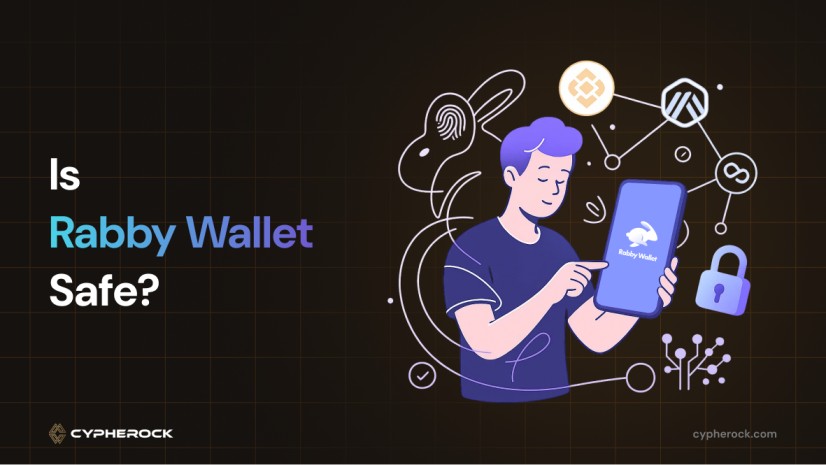

You’ve probably heard about the FTX collapse in 2022. That event made many users lose faith in big crypto platforms. After that, people turned to self‑custody wallets they control themselves.
With self‑custody, you hold your own crypto keys. No middleman can freeze or lose your assets. Decentralized finance (DeFi) grows fast. So do DeFi wallets.
One wallet gaining attention is Rabby Wallet. It is popular among DeFi users. But the big question remains:
Is Rabby Wallet truly safe?
Let’s dig into that question.
Rabby Wallet was built by DeBank, a respected DeFi team. That gives it credibility.
It is open‑source, so anyone can read the code. People and auditors check it. That brings transparency and trust.
Your crypto belongs only to you. Rabby is non‑custodial. DeBank does not control your funds. You hold your private keys.
Rabby offers transaction previews and risk scans. You see how your balance changes before confirming. You receive alerts about possible risks.
It also supports hardware wallet integration. You can connect devices like Ledger or Trezor. That adds offline protection.
All these features place Rabby at a high safety level.
If you interact with multiple EVM chains like Ethereum, Polygon, or Arbitrum, Rabby is a good fit. It supports many EVM networks.
You also can create multiple accounts in one app. That helps if you want to separate trading, staking, or investing wallets.
If you hold or trade NFTs, Rabby supports many NFT assets too. Viewing and transferring NFTs is simple.
But if you are new to crypto and don’t understand non‑custodial wallets, Rabby might feel risky. You must manage private keys yourself. If you lose them, there’s no way to recover funds.
So Rabby is best if you’re already comfortable with crypto security.
Rabby works on all major Ethereum Virtual Machine (EVM) networks. You can access Ethereum, Polygon, Arbitrum, Optimism, and more.
Rabby supports over 10,000 tokens. It also handles NFTs from many popular blockchains.
You can trade tokens inside Rabby. It connects to decentralized exchanges (DEXs) and some centralized exchanges. You get competitive swap rates.
You can connect your Ledger or Trezor to Rabby. This keeps your private keys offline. Rabby just signs transactions on your device.
You can manage multiple wallets under one Rabby account. This helps you organize funds for different uses.
Rabby does not charge fees for transfers. You only pay network fees. Swaps carry a 0.25% fee.
Rabby Wallet works as a browser extension on Chrome and compatible browsers.
It also has desktop apps for Windows and Mac. These apps mirror the extension’s features but in a standalone package.
A mobile app for iOS and Android is in beta testing. You can try it now or wait for the full public release.
Your seed phrase is the master key to your wallet. Never store it online. Write it on paper or use a fireproof metal backup. Keep it in private.
Make sure your device is malware‑free. Use antivirus software. Keep your operating system and browser up to date. Avoid installing suspicious apps.
Beware of phishing websites. Always double‑check URLs. Use browser security plugins. Bookmark trusted sites to avoid typos.
Use tools like De.Fi Shield to remove unnecessary permissions. Revoke dApp access when you stop using it.
Use De.Fi Scanner before approving new contracts. It scans tokens or contracts for hidden risks.
For more safety, use a hardware wallet with Rabby. For ultimate protection, consider Cypherock X1. It splits your private keys across devices. Even if one device is lost, your crypto stays secure.
Rabby gives you control of your own private keys and funds. It connects you directly to DeFi platforms and early access to new tokens.
Exchanges, on the other hand, hold your funds and keys. They offer easy user interfaces and high liquidity. But they can be hacked. They may freeze or lose funds.
If you care about full control and early DeFi access, choose Rabby. If you prefer convenience and aren’t comfortable managing keys, maybe use an exchange.
Rabby Wallet is built by a trusted DeFi developer, is open‑source, and provides strong security tools. These include risk alerts, transaction previews, and hardware wallet support.
Still, you need to manage your own keys and seed phrase. That adds responsibility.
For serious DeFi users with multiple EVM chains, Rabby is a solid wallet choice.
If you have large crypto holdings, or prefer the highest security, pair Rabby with Cypherock X1. It uses decentralized key parts and advanced inheritance features. That removes single points of failure and offers unmatched protection.

Ready to protect your crypto like a pro?
Check out how Cypherock X1 can help you secure your future - Explore now!.
Connect with us:
Twitter: @CypherockWallet
Telegram: Join the Community
